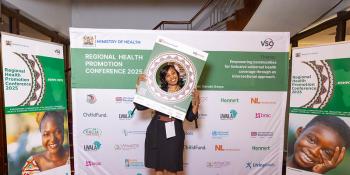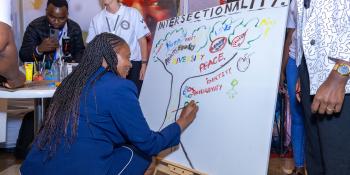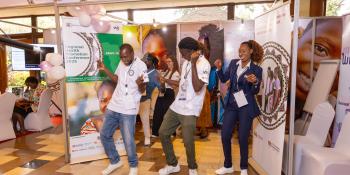After a 40-year career in the NHS in the UK, Phil Heywood, 72, is volunteering his skills to help tackle maternal deaths in Myanmar. He explains the global injustice of maternal deaths, and what is being done about it through UK Aid.
What makes you angry? I am recurrently furious that the world ignores the deaths of more than 200,000 women every year. I’m angry because most of these deaths are preventable.
When motherhood is fatal
UK Aid is investing in an end to thousands of needless deaths. I know, because I am part of it.
A maternal death is a rare tragedy in rich countries. In the UK, one woman dies for every 10,000 pregnancies.
In South Sudan, where I volunteered with VSO, a woman died for every 50 pregnancies. Many women have more than five pregnancies; so their lifetime risk of a pregnancy death is one in ten.
Pregnancy-related deaths tear families apart. Families in the developing world grieve no less than those in affluent countries. Motherless poor children are at least as disadvantaged as the motherless rich.
How much would it cost to save those lives? For me, it seems obscenely cheap.
How to reduce the death rate
It is crucial to provide a skilled birth attendant for every pregnancy and every delivery. This is usually a midwife. Developing countries need many more, and many current birth attendants need better skills.
UK Aid is investing in an end to thousands of needless deaths. I know, because I am part of it.
I volunteered having retired after 40 years as a NHS general practitioner. Through VSO I spent more than three years in Cambodia, a few months in South Sudan and a year in Myanmar - all to cut maternal deaths.
I don’t see patients. I don’t have photos sitting with pregnant women, or handling newborn babies! But I’m always thinking about their wellbeing.
Strengthening the supply of skilled birth attendants in Myanmar
I work on strategy and policy, and I train the people who train those critically-needed skilled birth attendants. My professional life was in the community, and I have a unique perspective on this work.
Today I’m working in Mandalay Midwifery Training School, Myanmar. I’m helping the staff develop their skills to be more effective teachers.
I watch them, I talk with them, run workshops, encourage them to try innovations. I networked a few PCs and laptops into an E-library and I write policies and procedures. I have met the Minister of Health & Sport and Mandalay’s Chief State Minister to advocate for midwives.

From anger to action
Am I effective? I may never know my personal contribution. I’m always part of a team.
That doesn’t stop me putting my heart and soul into the work and it helps me channel my anger for good.
I do know that during my time in Cambodia the maternal death rate was halved. How can we ever know what tragedies we have prevented?
Why are you Proud of Aid?
Do you have your own story to share? Use the hashtag #ProudofAid to join the debate on social media.
Latest posts

In photos: Our Regional Health Promotion Conference 2025
Check out some of our favourite photos from Regional Health Promotion Conference (RHPC25). This event sought to reimagine Universal Health Coverage through the lens of intersectionality.

Using intersectionality to create healthy beginnings and hopeful futures
World Health Day brings global attention to the urgent need to end preventable maternal and newborn deaths. Learn more about how our Regional Health Promotion Conference is tackling these issues head on.

Highlights from the Regional Health Promotion Conference 2025
The Regional Health Promotion Conference 2025 reimagined Universal Health Coverage (UHC) through the lens of intersectionality, by bringing together experts from across East Africa and beyond.
